VIPs in San Francisco
George McNear
Born March 27, 1830, Maine; Died December 30, 1901, Oakland, California
Grain Merchant George Washington McNear was born in Washington, Maine on March 27, 1830. In 1859, he married Amanda Marie Church, daughter of Reverend Albert Church of Bangor, Maine. They had four sons and two daughters; the oldest son, George W. McNear, Jr., worked with his father as manager for the firms interests in Liverpool, England.
McNear came from a line of sea-going men; at 15, he went to sea, and after making several voyages in foreign lands and along the Atlantic coast, he landed in New Orleans in February 1854, and was given command of a schooner plying the waters of Mississippi Sound and Lake Pontchartrain.

In 1856, at age 19, he became a part owner and the master of a steamboat plying the same waters, which he managed successfully until 1860.
After visiting his father in Maine, he left for California via Panama and arrived in San Francisco on August 2, 1860. He joined his brother in Petaluma; there they formed the partnership of McNear & Brother, commission and grain merchants.
In 1861, George W. McNear and his brother, George P. McNear, opened a branch in San Francisco. In 1867, they sent their first shipload of wheat to Europe.
In 1874, he withdrew from the familial partnership and established the house of George W. McNear, which became known around the world.
November 6, 1883, Daily Alta California, San Francisco, California, U.S.A.
THE PORT COSTA FIRE.An Approximate Estimate of the Losses and Insurance

A fire broke out at 2:30 a.m. on Sunday in the Snug Saloon at Port Costa, owned by McDonald & Fleming, which, before it could be controlled, destroyed Valencia & Johnson's shoemaker shop; Bay View House, three stories, F. Voss; McDonald & Fleming, saloon; Sullivan and Reordan, saloon; F. Marks, butcher shop; Port Costa House, three stories, Casey & Crowley; Curtis & O'Neil, grocery store, two stories; Commercial House; Brew & Denehy, saloon; Donahue, saloon, six cars loaded with wheat, and a lot of piling belonging to Mr. McNear. The Port Costa Wharf and Dock Companies' wharf was destroyed, and a lot of grain stacked on the wharf was damaged. Two ships lying at the dock, the Allonby and Lord Barnes, slipped their hawsers and got out of harm's way. There were two engines at Port Costa, which were kept as a means of protection against fire, but one was disabled and the other hand been taken to Benicia. It was brought back on the Solano, and together with the steamer Herald, which was passing at the time, was set to work in time to save the property which otherwise would have been totally destroyed.
The following is the latest estimate of the losses: Valencia and Johnson, shoemaker and vegetable shop combined, loss $950, no insurance; Voss Hotel, loss, $10,000, insurance, $4,000, insurance, $2,600; Sullivan & Reardon, saloon, loss $1,500, no insurance; butcher-shop, Mark's, loss, $600, insurance, $500; Breir & Denehy, loss, $2,400, insurance, $1,900; Burkee & Kelleher, loss, $6,000, insurance, $4,500; Donahue, saloon, loss, $500, no insurance; Curtis & O'Neil, grocery, loss, $6,000, insurance, $4,000; Casey & Crowley, loss, $3,000, insurance, $2,000 -- McNear owned the building, loss $10,000, insurance, $8,000; loss on wheat about $8,000. The origin of the fire is supposed to have been incendiary.
Daily Alta California, San Francisco, October 24, 1884
The ships Carnarvonshire and Manydown went up yesterday to McNear's wharf, Port Costa, to load wheat.
Daily Alta California, April 8, 1885
The British ship Magician goes today from Long Bridge up to McNear's wharf, Port Costa, to complete her cargo of wheat.
Daily Alta California, April 15, 1885
The British ship Calistoga, 1855 tons, will be loaded with wheat by George W. McNear on owner's account.
Daily Alta California, San Francisco, June 4, 1885
George P. McNear of Petaluma, part owner of the steamer Frank Silva, has applied to have the assessment on said vessel reduced from $10,000 to $5,000.
(Note: George W. McNear's brother.)
August 27, 1887, Daily Alta California, San Francisco, California, U.S.A.
Boom Notes
Real estate in the neighborhood of Martinez is beginning to stiffen in value and some large sales are reported. For 240 acres George W. McNear paid $40,000, and another large tract is reported to have been bonded to Kentucky parties for $180,000. Other transactions are hinted at which involve fully $680,000 . . .
|
In 1894, McNear acquired the flour mills and warehouses of Starr & Co., at Wheatport and Vallejo, the largest establishments of their kind on the Pacific Coast. He also owned 25 warehouses in the interior of the state. These, combined with his Port Costa, Wheatport and Vallejo warehouses, aggregate a storage capacity of more than 8,000,000 bushels of grain.
McNear was President of and instrumental in building the first electric street railroad system in Oakland, and was President of the First National Bank of Oakland.
October 5, 1892, San Francisco Call
THE STREETCAR DEAL.
Some Say It Has Been Consummated, While One Says No
For some time past negotiations have been pending for a consolidation of the interests of the North Beach and Mission Railroad with those of the Omnibus Railroad Company.
On Monday it was announced that the deal had been made and that the Omnibus had absorbed the North Beach line, and when Gustav Sutro, president of the first named company, was questioned in relation to the matter he touched his coat pocket with the tip of his forefinger and said, "I've got it all here."
Other parties who are well informed in regard to the matter declared yesterday that the deal is as good as closed, but George W. McNear, president of the North Beach line, said yesterday: "If the control of our road has been wrested from us it is the first I have heard of it, outside of what I have read. l am aware that the Omnibus people would like to get control, as the road has been a bug-bear to them in the past. We think, however, if it is so good for them it will not harm us, and there is little prospect of them getting away with it. We propose to put an electric plant in over the franchise, which is one of the most valuable in the city, and that will hurt the Omnibus. The control of the road has not changed hands yet."
March 23, 1894, San Francisco Call
McNEAR'S DEAL.
He Obtains the Starr Warehouses.
LOCATED AT PORT COSTA.
A Transaction of Very Great Importance.
LARGEST SHEDS IN THE STATE.
The Transfer Taken as an Indication That Starr & Co. Desire to Retire.
A deal was made a day or two ago by which one of the largest business concerns in the State indicates its intention of retiring from the commercial world, and another concern of similar proportions indicates its intention of largely increasing the facilities for dome business. The deal referred to is the transfer of Starr & Co.'s interests in the grain business to George W. McNear.
All the parties interested in the transaction are maintaining the strictest silence concerning what has transpired, and an endeavor to learn the true inwardness of the affair met with but poor results.
This much, however, is certain. Some time Geo. Starr & Co. let it become known that they were about to dispose of some of their commercial property, and invited an investigation into what they had to sell.
No reason was given for the contemplated sales, but in commercial circles they were taken as an indication that the rumor relative to the retirement of Starr & Co., which had been current for some time, was about to assume tangible form.
Among the first pieces of property to be placed on the market were the grain sheds, warehouses and storerooms owned by Starr & Co. These buildings are located at Port Costa, and are by far the largest grain sheds in this section of the country. They extend along the bay for a distance of no less than 2000 feet, and have a capacity of several hundred thousand tons of grain. As an adjunct to the warehouse a large wharf lines the side of the building which fronts the water's edge, and this wharf has been rendered serviceable under all circumstances by an immense amount of dredging which was done some time ago. Ships of any depth and dimensions can be moored right up to the sheds and loaded, thus doing away with that, enormous expense which would be incurred in transferring the grain to this city before placing it on board ship.
When Starr & Co. concluded to dispose of this warehouse they sent to several heavy dealers in grain and made known their intentions. The value that was placed on the warehouses at that time was somewhere in the neighborhood of $300,000.
A company was talked of for the purpose of purchasing the sheds, and quite an amount of capital was subscribed, but for some reason the plan was never carried out. Then for some time all interest in Starr's desire to sell died out, nor was it revived until it became known that George W. McNear has become the proprietor of the Port Costa warehouses.
Just what price McNear paid for the property is not known, but the impression prevails that no reduction was made by Starr & Co. in the price originally placed upon their property. When spoken to relative to the recent acquisitions to his business interests Mr. McNear refused positively to give out any information.
"I have the warehouses," said he, "but I decline to say anything in regard to the matter. I cannot understand why any one should want to know. My business affairs surely do not interest the community at large." When questioned regarding the probable retirement of Starr & Co., McNear said: "I am not at liberty to discuss that matter, and must refer you to some member of the Starr firm." At the office of Starr & Co. a similar silence was maintained.
That McNear had taken the Port Costa warehouses was admitted, but the significance of the sale, the amount of money involved or the probable future of the firm were subjects upon which every one refused to talk.
April 1, 1894, San Francisco Call
THE WHEAT KING SUED.
Rich & Co. Charge George W. McNear With Fraud.
A suit has been filed in the Superior Court by D. Rich & Co. of New York against George W. McNear, the wheat king. The suit is for breach of contract, under which Rich & Co. claim that they were commissioned to sell McNear's warehouse business at Port Costa for $1,200,000. This contract was entered into in 1890, and McNear is said to have represented that the net profits for each of the three preceding years amounted to $185,000. Rich & Co. negotiated with an English syndicate to purchase the business, but the latter first demanded an inspection of McNear's books.
The inspection was granted, but McNear subsequently prevented any further inspection and confessed that the profits for 1889 showed a considerable falling off from preceding years. On this showing the negotiations with the English syndicate fell through.
It was agreed that Rich & Co. should receive $200,000 as their commission on the sale, and they now sue McNear for that amount, alleging fraud on his part, and asserting that but for his willful deceptions they would have successfully carried through their negotiations.
April 7, 1894, Pacific Rural Press
George W. McNear has acquired Starr & Co.'s interests in the grain business, including the warehouses, etc., at Port Costa. Both parties decline to discuss the deal, though admitting that it has been made. In the minds of some persons the purchase has created the belief that McNear is preparing for another plunge into the wheat market similar to the one he made not very long ago. Then he bought wheat right and left and was fast gaining a controlling interest in the market. He was eventually compelled to stop, however, because of his inability to secure storage room. During his former plunge McNear chartered about every wheat vessel that headed for this port, and had he been in a position to carry out his plans he would have ended with quite an addition to his bank account. The purchase of the Starr warehouses gives color to the belief that a second plunge is being arranged.
July 28, 1895, San Francisco Call
McNEAR IS A MILLER.
The Wheat King Engaged in Grinding Out Flour in the Old Starr Mills.
George W. McNear, the "wheat king," has developed into a full-fledged miller and is operating the old Starr Mills at Port Costa and South Vallejo. Rumors were rife that McNear was going into the manufacturing business when the lease of the Starr mills at South Vallejo to the Sperry Flouring Company expired. This occurred on June 30, and since that time McNear has been at work renovating the old plants and putting in new machinery both at Port Costa and South Vallejo.
"McNear has thoroughly embarked in the milling business," said a flouring man on 'Change yesterday, "and the merchants are waiting with no little curiosity to see what he is going to do. The Starr Mills are known to be the most thoroughly equipped on the coast, and the 'wheat king may prove a powerful factor in the market, although competition is already very keen between the Sperry Company, the' Crown Mills and the Oregon Mills. The Starr Mills once had the greatest trade on the ocean, and furnished flour to Ireland exclusively. That trade, though, has gone entirely to the Oregon.
"McNear has three men on the street and he started the ball rolling toward the Orient on the last China steamer, shipping 1200 barrels. The flour business here is now very fair, although prices are low."
August 14, 1897, San Francisco Call
Big Flour-Makers Incorporated.
George C. Perkins, Alfred Bannister, Albert Miller, A. W. Starr, A. D. Starr, Justus Greely and N. D. Rideout have organized and incorporated the business of Starr & Co. to deal in grain and manufacture flour. The stock has been fixed at $2,500,000, of which $830,000 has been actually subscribed, as follows: A. D. Starr and A. Bannister, $200,000 each; A. W. Starr, $150,000; Justus Greely. George C. Perkins, N. D. Rideout and Charles Gondall, $50,000 each; Albert Miller, $15,000; W. M. Starr, $20,000; F. J. Bowman, $30,000; C. F. Ebner, $10,000. George W. McNear, Jr., is president of the company and J. Percy Rothwell is secretary.
November 20, 1897, Sacramento Daily Union
TO MAKE BEET SUGAR
A New Corporation Organized for That and Kindred Purposes.
|
Articles of incorporation of the California Beet Sugar and Refining Company have been filed in San Francisco. The incorporators are: Robert P. Rithet, George W. McNear, George W. McNear, Jr., George E. Fairchild, C. M. Cooke, O. M. Vesper and Louis Sloss. The expressed object of the incorporation is to conduct in the State of California and in any other State, Territory or dependency of the United States, and in any foreign country, a general merchandise, manufacturing, agricultural, shipping and commission business, and especially to deal in and manufacture sugar and sugar products, whether or not such sugar and sugar products shall be derived from beets or sugar cane. The capital stock is $2,500,000 divided into 25,000 shares of the par value of $100, and at the time of the filing of the articles the amount of the capital stock actually subscribed was 200 shares.
February 1, 1898, San Francisco Call
George W. McNear's new gasoline launch Port Costa is going to be the fastest thing of its kind on the bay. She will be used as a dispatch boat between her owner's summer home and grain warehouses at Port Costa and the city.
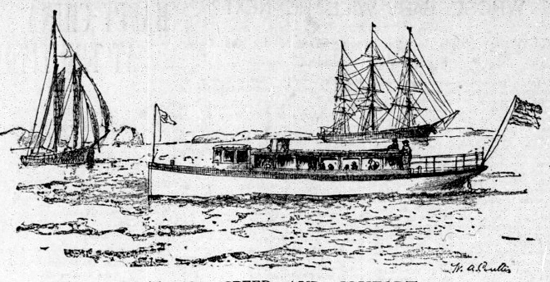
July 19, 1900, San Francisco Call
McNEAR URGES FORMATION OF NEW EXCHANGE
Says Merchants Should Have Representative Trade Organization.
|
President George W. McNear of the San Francisco Produce Exchange made a report yesterday at the annual meeting of the exchange concerning the progress being made toward the formation of a new Merchants' Exchange. The sale of the present Merchants' Exchange property for $300,000 to the proposed new organization was authorized some time ago. An option of sixty days from July 1 last was given, so President McNear reported, then 170 members of the Produce Exchange have enrolled themselves an subscribing members to the proposed now body, with the proviso that at least 500 members shall be secured. Six hundred persons who are not members of the produce Exchange were invited to subscribe. One hundred have accepted the invitation and one hundred others have promised to give the matter favorable attention.
"Every first class city has its large general exchange, embracing in its membership all the various branches of trade," said Mr. McNear. "That such exchanges do exist is owing to the manifest advantages of cooperation. To my mind no where is there greater need of such an exchange than in the city of San Francisco. Let us take the initiative and bring together the mercantile, manufacturing and shipping interests in one grand exchange. Do not let the opportunity slip, but rise to the occasion and make it a success. Then we can all congratulate ourselves upon the formation of a true Merchants' Exchange that with its beneficent supervision will be a fitting home for all time for all the mercantile and financial interests of this city."
The president also alluded to the gains and losses in membership in the year last past. J. Martenstein. H. V. Deming, H. Dutard and S. Sweet had died, the first three named having been charter members. Thirteen new members had been admitted and thirteen retired. The treasurer had a balance of $2584.69, the president said. During the year sixty-nine shares of Merchants' Exchange stock were purchased at $90 per share. T. C. Frledlander was re-elected secretary by the board of directors.
December 30, 1901, San Francisco Call
AGED GRAIN KING CALLED BY DEATH
George W. McNear Dies at Age of 72 Years After a Long Illness
|
OAKLAND, Dec. 29. -George W. McNear, the California grain king, died at his home, 957 Linden street, in this city this afternoon, after an illness which had lasted for more than a year. He was 72 years old.
For nearly half a century, McNear was one of the foremost figures in the commercial life of California. He was the leading grain producer and shipper in the state during the period when California was recognized as one of the greatest wheat sources, and at one time he owned more than 1,000 acres of grain lands in various parts of the state. His great warehouses at Port Costa had a capacity of 60,000 tons, and during the early part of his commercial career he shipped wheat in his own vessels to all parts of the world. During the high tide of his prosperity he amassed a large fortune, which has dwindled considerably in recent years, owing to the decline of the wheat industry on the coast.
NEVER ACTIVE IN POLITICS. Although McNear never took any active part in politics and always refused to accept any public office, he devoted a large part of his time to advancing the civic welfare of San Francisco and it was largely due to his personal efforts that the present building occupied by the Merchants' Exchange of that city was built. McNear was president of the organization at the time the building was erected, and had occupied the 'office for a number of years previously. He was a member of the Pacific Union Club Of San Francisco and the Masonic order.
McNear's early life was spent aboard ship. Born in the town of Washington, near Wiscasset, Me., in 1837, he went to sea at the age of 15, after having received a rudimentary education in the schools near his home. When but 18 years old, he became master of a sailing vessel and for six years, he commanded ships plying on the eastern coast. In 1860 he made his first voyage to California, landing in San Francisco August 2 and determining almost immediately to make his home in this state.
STARTED IN PETALUMA. Shortly after his arrival he went to Petaluma and started in business with his brother. Soon, however, he went into the grain business for himself, and from the very beginning he achieved success. Within a short time he became the owner of a number of coast, and sea going vessels upon which he exported his his grain, and in 1864 he built a steam vessel which he named the "Josie McNear," in honor of his wife. He earned the soubriquet of "California grain king."
A widow and six children survive the dead financier. The children are Mrs. P. E. Bowles of Oakland, John A. McNear of San Francisco, George W. McNear, Jr. of this city, Fred W. McNear, Miss Elizabeth McNear and Seward B. McNear, all of Oakland and San Francisco. All of the members of his family were at his bedside when, the end came.
CELEBRATED GOLDEN WEDDING. November 2 last, McNear and his wife celebrated the golden anniversary of their wedding, the affair being extremely informal owing to the invalidism of the husband. The couple were married at Bangor, Maine, in 1859; one year before they came to California. Mrs. McNear, prior to her wedding, was Miss Amanda M. Church. In 1874 the McNears moved to Oakland and five years later built the handsome residence in which they have dwelt ever since.
A little more than a year ago Mr. and Mrs. McNear celebrated with their daughter, Mrs. Bowles, the silver anniversary of her wedding with Philip E. Bowles, president of the First National bank of the city and the American National bank of San Francisco, succeeding his father in law as the head of the former institution.
The funeral will be held from the home at 2 o'clock Friday afternoon, Rev. Charles R. Brown officiating. The internment will be held privately in Cypress Lawn cemetery, San Francisco.
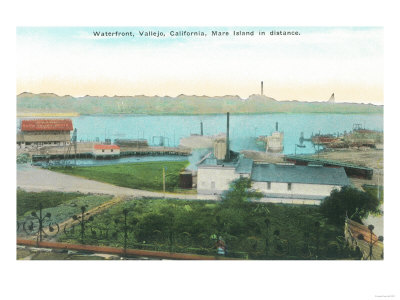
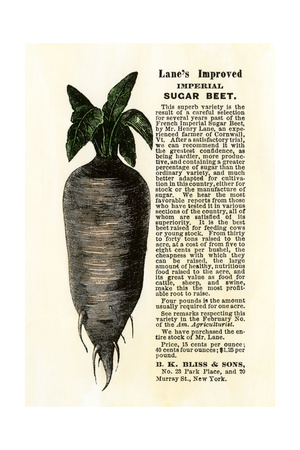
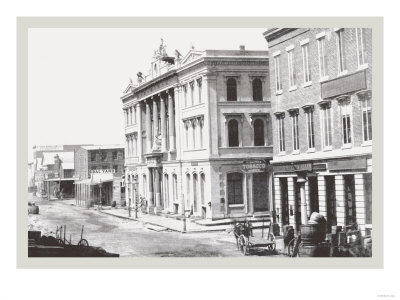
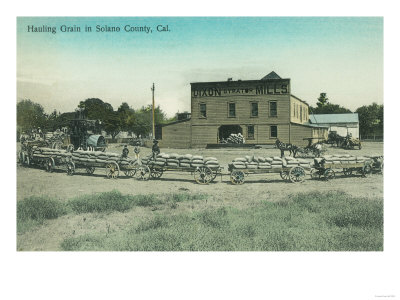










 Copyright ~ 1998-2018.
Copyright ~ 1998-2018. 